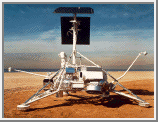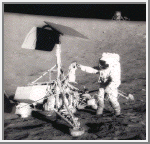











|
Courtesy of the Jet Propulsion Laboratory and NASA's National Space Science Data Center
The Surveyor probes were the first U.S. spacecraft to land safely on the Moon. The main objectives of the Surveyors were to obtain close-up images of the lunar surface and to determine if the terrain was safe for manned landings. The Surveyor spacecraft were designed to soft-land on Moon. The series debuted on May 31, 1966, when Surveyor 1 was launched toward the Moon. The spacecraft's remarkable success at setting down on the lunar surface exactly as planned electrified the scientific community and sparked worldwide acclaim. Six more Surveyors were launched through January 7, 1968, with five successful landings in all. Surveyors 1, 3, 5 and 6 landed on maria near the Moon's equator. Surveyor 7 landed on the highlands just north of Tycho crater.
The science instruments on the spacecraft varied from flight to flight, but included cameras, surface samplers and soil analyzers. In all, the Surveyors returned nearly 88,000 high-resolution pictures of the Moon's surface and performed the first soil analysis. Surveyor 3, which touched down in the Ocean of Storms, brought a new robotic tool, the "scratcher arm," into use on the Moon. Apollo 12 astronauts Pete Conrad and Alan Bean landed just 156 meters (512 feet) away from Surveyor 3 in November 1969. They removed the arm and other parts of the spacecraft so that scientists could study their condition after 2.5 years of exposure to the space environment.
| Surveyor Images |
|---|
 Surveyor
Surveyor
A full-size engineering model of the Surveyor robotic lunar
spacecraft is shown on the beach near Los Angeles, Calif. Seven
Surveyors were launched toward the Moon between 1966 and 1968 to
make soft landings as precursors to the Apollo astronaut
missions. The successful missions and landing dates are: Surveyor 1 on
June 2, 1966; Surveyor 3 on April 19, 1967;
Surveyor 5 on September 10, 1967; Surveyor 6 on November 9, 1967;
and Surveyor 7 on January 9, 1968.
(Courtesy NASA/JPL)
 Surveyor 7 Panorama of Tycho Crater
Surveyor 7 Panorama of Tycho Crater
This panoramic view of Tycho crater was acquired by the Surveyor 7
spacecraft. Surveyor 7 was launched on January 7, 1968. The spacecraft
landed on the lunar surface January 10, 1968, on the outer rim of the
Tycho crater. Operations of the spacecraft began shortly after the soft
landing.
(Courtesy NASA/JPL)
 Surveyor 3 Visited by Apollo 12 Astronauts
Surveyor 3 Visited by Apollo 12 Astronauts
This photograph shows an Apollo 12 astronaut examining the Surveyor 3
lander in November 1969. Surveyor 3 landed on the moon on April 20,
1967 at 2.94° south latitude, 23.34° west longitude in
the southeastern part of Oceanus Procellarum. Equipment on board
included a television camera and auxiliary mirrors, a soil mechanics
surface sampler, strain gauges on the spacecraft landing legs, and
numerous engineering sensors. Two-and-a-half years later,
Apollo 12 astronauts Pete Conrad and Alan Bean
landed 156 meters (512 feet) away from Surveyor 3 and removed parts of
the spacecraft for analysis back on Earth.
Views of the Solar System Copyright © 1997-2000 by Calvin J. Hamilton. All rights reserved. Privacy Statement.